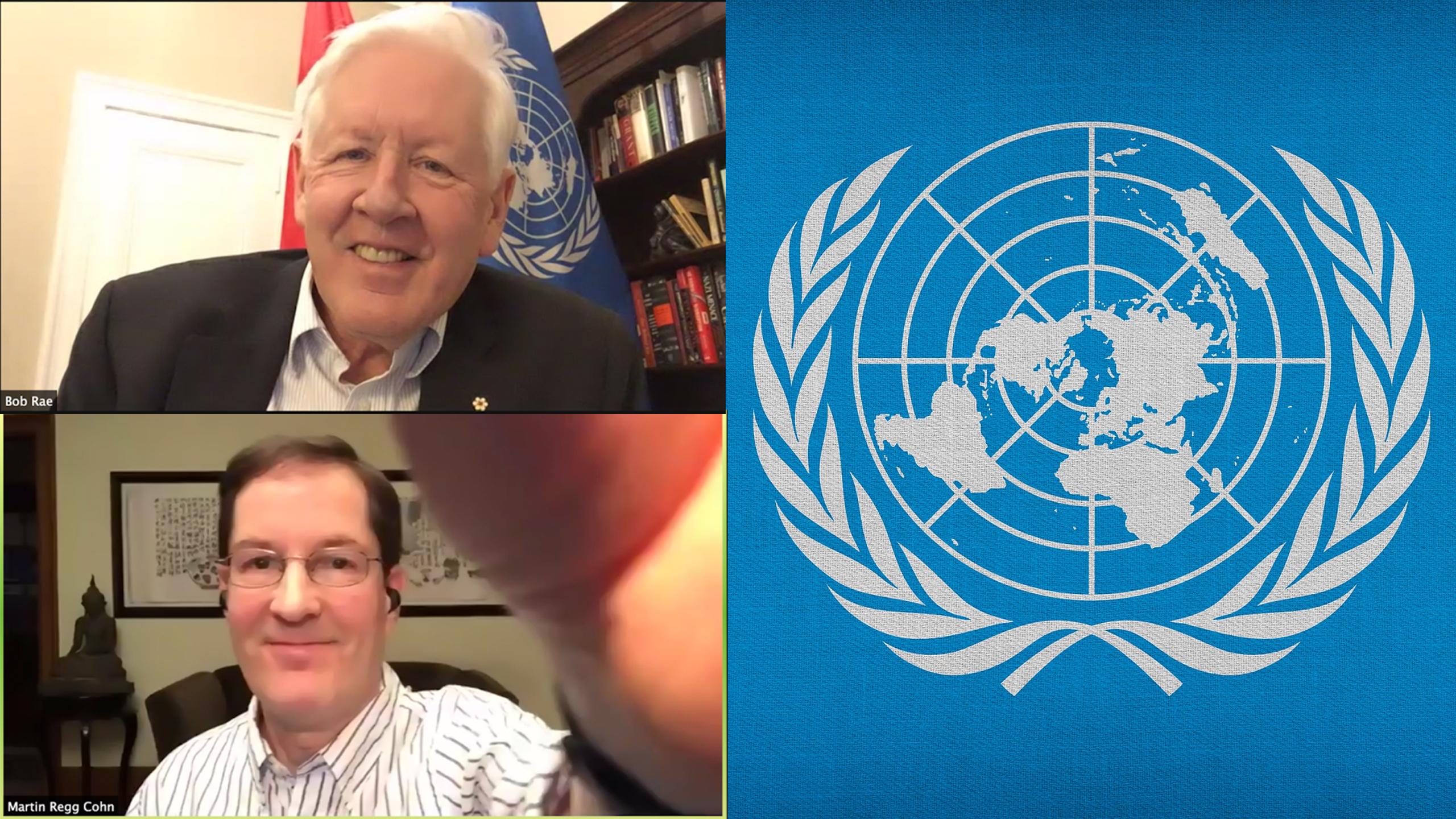By Naomi Chen and Kiernan Green
Content Warning: This story discusses the persecution and genocide of Muslims in China.
Bob Rae, Canadian ambassador to the United Nations, shared his views on a number of controversial international affairs with Toronto Star columnist Martin Regg Cohn and members of the Ryerson community at Ryerson’s Democracy Forum on Jan. 28.
Rae is no stranger to the political landscape. From 1990 to 1995, he served as Ontario’s premier with the Ontario New Democratic Party. After a few years away from politics, he served as the interim leader of the Liberal Party of Canada in 2012. Rae was then appointed as Canada’s ambassador to the United Nations in 2020.
Prior to this role, Rae served as chair of the Forum of Federations, overseeing constitutional discussions between the government of Sri Lanka and the Tamil Tiger rebels. He was also the chief negotiator and counsel for the Matawa First Nations in northern Ontario during regional strategy negotiations with the Province of Ontario.
Canada and Saudi Arabia in Yemen
During the event, Rae was asked about Canada’s decision to sell arms to Saudi Arabia. Saudi Arabia has been a central actor in Yemen’s civil war since 2015.
Saudi-led airstrikes have killed thousands of Yemeni civilians, according to Amnesty International. The combined interventions of outside states in Yemen’s civil war has killed over 230,000 Yemenis to date—over 3,000 of whom were children. These actions may amount to war crimes, said Kamel Jendoubi, chairperson of the UN Group of Eminent International and Regional Experts on Yemen, in a Security Council session.
Last September, a United Nations panel named Canada as one of the countries fuelling the war due to an increase in arms sales to Saudi Arabia in 2019, according to The Globe and Mail. Canada exports armoured vehicles to the country, which The Globe and Mail reported were involved in operations in Yemen.
Over 20,000 people have advocated for the Trudeau government to go back on their Saudi Arabia military exports, according to Amnesty International.
On Jan. 25, Kiké Roach, Ryerson’s Unifor National Chair in Social Justice and Democracy tweeted that the forum was “a good time to ask [the UN ambassador] Why is Canada sending weapons to Saudi Arabia which is killing innocent civilians in Yemen?”
Bob Rae, Ambassador to the United Nations, is speaking at Ryerson on Thursday, Jan 28th 4PM – 5PM- A good time to ask him Why is Canada sending weapons to Saudi Arabia which is killing innocent civilians in Yemen? and other questions…
— RyeSJChair (@RyeSJChair) January 25, 2021
Register here: https://t.co/BSZNuPYT6j https://t.co/eOUwt2dk3Y
“We don’t sell arms to any of the parties of the conflict,” said Rae during the panel. He also added that “vehicles sent to Saudi were decisions that were already made” by the previous Stephen Harper federal government.
According to the Middle East Eye, Trudeau’s Liberal government continues to export arms to Saudi Arabia, with $2.2 billion of military hardware sold in 2019 alone. On Jan. 25, 30 protestors in Hamilton, Ont. took to the site of Paddock Transport International Trucks, who manufacture some of the light armoured vehicles being sent overseas.
Canada and China
The panel also discussed China and their treatment of two Canadians, Michael Kovig and Michael Spavor, who are currently imprisoned in China on espionage charges. Their arrest in 2018 immediately followed Canada’s house arrest of Meng Wanzhou, CEO of the Chinese company Huawei.
“We’re not uncivil when we meet [with Chinese diplomats], but they should know how we feel,” said Rae regarding the two imprisoned Canadians. “We have a very strong view about the taking of two Canadians on trumped-up charges as a response to what we…arguably had to do in response to an extradition request from the United States.”
Rae also stressed the importance of a fact-finding mission to identify evidence of genocide against Uyghur Muslims in China’s Xinjiang province, in order to find evidence that can be used in international courts. He raised the example of Indonesia, where it took them over one and a half years to find evidence of genocide.
Human rights groups around the world have continuously maintained that China’s Uyghur’s population is being subjected to genocide. On Feb. 22, the House of Commons voted to recognize the plight of the Uyghurs as genocide. However, Trudeau and his cabinet abstained from voting, according to The Globe and Mail.
“When you look at the category of information we’re getting about the Uyghurs, it’s very possible to reach the conclusion of genocide,” said Rae, considering reports of forced sterilization. “It’s about…a level of oppression that singles out a group and targets a group because it’s a group, because it’s the other.”













Leave a Reply